|
|
|
 |  |  |  |  |
Medusa's: Chicago's missing link
Jacob Arnold explains how a little-known teen club for weirdos came to make a deep social and musical impact on Chicago's scene.
There are a handful of American dance clubs from the 1980s—the Paradise Garage, the Warehouse, the Muzic Box—whose names have become synonymous with underground music. Then there are those whose impact has gone unacknowledged. Medusa's, a Chicago teen club that opened after the Warehouse closed, inspired an entire generation of dance music producers, from mainstream figures like Tommie Sunshine and Kaskade to underground artists like Hieroglyphic Being. It was a place where leather-clad industrial music fans rubbed shoulders with preppie house music jackers, shaping both genres in the process.
The club was founded 30 years ago this October by David "Medusa" Shelton, an energetic party promoter nicknamed for his curly blond locks. I first met Shelton on a foggy summer night at his latest club, out in the western suburb of Elgin. After ascending a steep stairway past noisy teens and velvet ropes, Shelton guided me through an airport-themed lobby to a dark, mostly empty lounge where three women in fishnet stockings go-go danced on the bar. We took a shortcut through a fire exit and a brightly lit back stairway before weaving through the crowded dance floor, eventually arriving in a shabby back office with an enormous oil painting of Liberace leaning against the wall. Shelton wore a sweatshirt and skinny jeans, his frosted hair artfully arranged above his tan face.
Shelton grew up in Elgin, but quickly found an escape. "In my early days of clubbing, I actually lived in Hawaii for a while," he says. "That was part of the whole glam rock period." In Waikiki he and a group of fellow beach bums danced at hula bars and discos that "went kind of gay and mixed—bi-sex—all the whole mix. We helped transform that island a little bit, I think."
Medusa's roots lie in the Warehouse, the club that inspired the name "house music." Returning to Chicago around 1977 to work at United Airlines, Shelton wasn't happy with the music scene until hearing Frankie Knuckles at Robert Williams' afterhours club. Shelton found the Warehouse concept intriguing. "I learned a lot from [Williams]," he says. "He taught me how to do all the not-for-profit stuff."
In fact, Shelton threw his first event at the Warehouse, March 17, 1979 calling it Men In Progress, with Frankie Knuckles as DJ. He then threw a series of "hit and run" parties at established discos throughout Chicago, including the Bistro and Coconuts. In October 1980, inspired by the Warehouse, Shelton founded his first afterhours club, 161 West, on Harrison Street near the Loop. Knuckles played there for a series of Friday night costume parties. A print ad for the club describes dancers "jacking their bodies all night." Williams evidently saw the club as competition, writing a pointed letter to Gay Life in December declaring, "[161 West] is not the first after hours club of its kind... and also not the first to offer top name entertainment to its clientele."
"He really didn't like me and Frankie together, and I know and I get it now," explains Shelton. According to Shelton, Williams briefly considered moving the Warehouse to 161 West, but ultimately Knuckles left to start his own club, the Power Plant. At the end of his letter, Williams graciously described 161 West as "our sister club."
Shelton picked 161 West Harrison Street for its water tower and rooftop views, but he soon discovered the windows steamed up when the party was packed. Shelton says his lease was doomed as soon as the building owner realized it was "a black crowd, and it was this wild club." A year later, he was forced to relocate.
Shelton recalls the day he discovered the site for Medusa's, at 3257 North Sheffield. He was walking by when he saw a "for rent" sign in the window. "I rented it that day not knowing anything about licensing, neighborhood issues, nothing!" The building was an old Independent Order Of Vikings lodge before becoming home to one of William Russo's experimental Free Theater companies in the early '70s.
According to Gay Life, the club's first night, Saturday 22 October, 1983 was an invitation-only affair. At first, Shelton employed a rotating cast of local DJs, including Frank Lipomi, Mark Hultmark, Michael Graber, Mark Vallese and Kasey Crabtree. Then he began to focus on two: Bud Sweet, who was known for playing "modern" or "new" music at Neo's, and Mark Stephens, a 29-year-old former manager at Sears, who Gay Chicago once named DJ of the year.
Greg "Blue" Pittsley, a close friend of Shelton, worked at Medusa's and became the club's manager. He explains that even though Sweet and Stephens started as DJs with completely different styles, they "began influencing each other and their tastes in music," and soon were spinning records he never would have expected, from electro to industrial to New Wave. "All of a sudden we had a full dance floor Friday and Saturday," Pittsley says.
The rise of Medusa's coincided with the rise of Wax Trax! Records, a label founded by Jim Nash and Dannie Flesher. In 1978, the couple opened a record store on Chicago's North Side. Their label's first releases were Strike Under's "Immediate Action," Divine's "Born To Be Cheap" and Ministry's first single, "I'm Falling," all in 1981. By the time Medusa's opened, Wax Trax! Records was introducing Belgian industrial group Front 242 to the US.
Mark Stephens' playlist for June 28, 1984 (as recorded inGay Chicago magazine) ranges from Midwestern pop stars Prince and Loleatta Holloway to budding house artist Jesse Saunders' "Funk U Up." Mix tapes from 1985 demonstrate a shift to darker fare, including Ministry's "All Day," Portion Control's "The Great Divide," Anne Clark's "Our Darkness," Frankie Goes To Hollywood's "Two Tribes" and Vicious Pink's "Cccan't You See." Mark Stephens "could play everything, and he could mix it seamlessly... but his strength was really programming. He knew how to make a dance floor move," Teri Bristol, a fellow Chicago DJ, recalls. "He was like James Dean kind of cool—just sort of like a natural cool guy, and people were so drawn to him."
Teri Bristol soon began spinning at Medusa's, too. "[Stephens] took me under his wing and mentored me," she says. At one point DJs Bristol, Stephens and Psychobitch all lived in rooms at the club, as did Shelton. Asked for signature tracks, Bristol immediately cites the Wax Trax! singles "I Will Refuse" by Pailhead and "Everyday Is Halloween" by Ministry, admitting she would play "pretty much anything by Front 242 and Nitzer Ebb." Surprisingly she also mentions the early hip-hop/electro cut "Watch The Closing Doors" by I.R.T., which house DJs Ron Hardy and Farley "Jackmaster" Funk were also known to play.
At the time, with popular sounds like post-punk and post-disco, boundaries between genres were fuzzy. In the June 19, 1982 issue of Billboard, Cary Darling notes that Kraftwerk was getting "massive R&B and dance play" across the US and so-called "new music," a somewhat more accessible version of new wave, was "spurring renewed interest in 12-inch singles and EPs and providing crossover material" for clubs and radio.
In 1984, Medusa's began to host live performances, including ESG and Violent Femmes. In September, a Ministry show was followed the next week by Front 242's first US appearance. "It was a roar of machines and the hammering of a thousand boots jumping up and down," Smart Bar and Metro owner Joe Shanahan told Spin.
The Red Hot Chili Peppers played that November to a room filled with skateboard ramps, though, Shelton quips, "No one knew who the hell they were." 1985's lineup included Liquid Liquid, Front 242 again and Divine. "She showed up at the back door, her wig off, just this bald head!" says Shelton. Anne Clark, whose song "Our Darkness" was a club favorite, performed live in June 1986.
Medusa's third floor was divided into shifting spaces, including an art gallery, a room for performance art and a video room that had beanbag chairs and a large projection screen with stacks of monitors on each side. Video jockey Joe Michelli was poached for Medusa's while working at Berlin, a nearby club that opened around the same time. The video set-up included cutting edge technology, such as an editing deck that allowed Michelli to insert brief non-linear snippets of footage. At the time, not all singles had music videos, so Michelli and other VJs put together their own custom visuals. "We would have boxes full of VHS tapes," Michelli says. "I was the guy who would come in there and sit from 10 'til 3 in the morning assembling and insert editing all this crazy stuff that I'd get off the television—steal from movies. Leroy [Fields] would go to the video store, and he'd just come back with a stack of stuff."
From the beginning, David Shelton encouraged performance artists to create installations for the club. One group, SSPU, which later became SXPU, created an installation called Digest Blood Beat. Rod Rushing remembers "pseudo-electrical machines" with noises and blinking lights. Upstairs, a bathtub was full of red liquid, and a bound Louanne Ponder writhed to a tape loop growling, "You know you like it like that, don't you, baby!"
Another performance group, Family Plan, lived together and ran a storefront. Its members walked the streets of Chicago in bizarre, custom clothing. Pittsley describes their performances as macabre and disturbing. "There was a glass case on the mezzanine which was basically a small sliver of a room with two big picture windows," he recalls. "One time, on one side it was an elegant cocktail party with all of these people in black, and on the other side were people who were sitting in this sort of clinical setting, and they had IVs in their arms that were pumping their blood into tubes that were filling the glasses of the people on the other side."
Every few months the club's decorations would change. A Chicago Tribune article, from October 1986, describes neon and black lights, "giant Tinker Toy replicas dangling overhead," and a dance floor "broken up by obelisks decorated with apocalyptic graffiti." One of the first theme parties, according to Rushing, involved a human zoo. Wooden cages all over the club contained specimens such as a secretary, a TV viewer on his couch, and a heavyset man in a pig mask and ladies underwear preparing for a night out.
Early on, the Medusa's family faced dark times. "By '85 a lot of our friends were getting sick and dying, 'cause AIDs was happening," Rushing says. "There was a lot of unspoken fear and sadness that was swirling around all that at the same time. I tested positive in 1985. My best friend passed away a month after I tested positive. And then Mark [Stephens], I think, tested positive right around that same time."
Medusa's DJ Mark "Hot Rod" Trollan, who mixed and edited the first commercial release of Jamie Principle's house classic "Your Love," passed away December 19, 1986 at the age of 31. Rod Rushing helped sprinkle his ashes on the dance floor, to the Red Hot Chili Peppers' "True Men Don't Kill Coyotes." In some ways the club provided a welcome escape. "The experiences were richer because they were some respite," Rushing says. "At nighttime when the music was loud and everything was going on, there was really an opportunity to sort of forget."
Because Medusa's was in a residential area it met with immediate resistance from its neighbors. In November 1985, Alderman Bernie Hansen led a police raid of the club for alleged occupancy violations. In January 1987, Hansen and Eugene Schulter introduced an ordinance forcing juice bars to register (for a fee) and follow bar hours, citing complaints from residences. Hansen claimed clubbers were hanging out near Medusa's drinking, smoking and having sex in their cars. Another factor was Medusa's clientele, which the Sun Times described as youths with "spiked fluorescent hair and [a] penchant for black leather." Stoking these fears, the same article stated that three teenage regulars "confessed to Hanover Park police that they plotted to kill the father of one of the trio in a meeting at Medusa's."
The juice bar ordinance passed January 1987, going into effect April 1. Afterhours clubs throughout the city were affected, including the Muzic Box and the Power Plant. Ironically, the changes to Medusa's hours made for a younger crowd, since it was no longer a destination for drinkers after last call. To encourage the transition, Shelton worked with a promoter to create special hours for 13-15 year olds and to place ads in school newspapers. It was around this time that the house producer Jamal Moss (AKA Hieroglyphic Being) first visited the club, at the age of 14. "And that was by accident," he says. Moss and his friends walked by one night and were drawn in by the crowd outside. For Moss, it was a "culture shock to be around that many people of non-black origin... coming from the hood and then hanging out in the spot, it was mind-blowing."
Chicago has always been a heavily segregated city, but by all accounts Medusa's brought together teenagers from a variety of backgrounds. VJ Leroy Fields says, "Our club would draw straight kids, gay kids, punk kids, goth kids, skinhead kids, Asian kids, black kids, suburban kids, city kids—even sailors would come there from the [Naval Station] Great Lakes. The Navy sanctioned it 'cause they weren't drinking."
Shelton recalls sailors in uniform dancing next to house heads, drag queens and early goths. "You would see the jocks and the cheerleaders and all [of] them come because we were the place to be," Shelton says, "but the other people ruled. For once they ruled, you know?"
"Me and some of my friends, we became the equivalent of what you would call black goths," Jamal Moss says. "We started wearing the eyeliner, the hoop earrings, the whole black kilts with the black combat boots, the black suit tops. And I'm glad to say there ain't no photos floating around with me looking like that!"
Unfortunately, a crowd containing that many different groups of young people didn't always get along. "Fights would pop off in the club, on the side of the club. Definitely in the Dunkin [AKA Punkin] Donuts parking lot," says Moss.
"I had my worst night out of my life at Medusa's," Detroit techno artist Derrick May said via Facebook. "One time I was coming into the club and the door guy holding the clipboard with the guest list told me, 'We don't want your kind of people coming in here—go down to Halsted Street [to the Power Plant] where you belong. I punched him in his face as hard as I could, knocked his ass out cold, and I ended up spending my 21st birthday in jail. I never ever went back there."
Shelton admits, "I had all these skinhead securities." But not all Chicago skinheads were white supremacists. In fact, some were black, and they called themselves "Bomber Boys." A 1989 Chicago Reader article explains the phenomenon, profiling Medusa's patron Dwayne Thomas (who, oddly, had already been featured in The Observer).
Not everyone's memories of the security staff are negative. "Those guys were as loving and as caring as anybody else," says Pittsley. "We got them to go out with us in drag on Halloween, and they were proud of it. They would protect us and look out for us, and we did the same for them."
In 1987, Medusa's crowd began to change, in part due to a new DJ—Jonathan Gilbert, AKA Scrappy. "There was a period of time when I did teen and late night back to back," he recalls. "When I told everybody to get out for teen night, I would have to run down the street on my scooter, even in the winter, get a sandwich at the deli, get a fifth of vodka, and head back in time to get back there and start DJing." Gilbert began to draw a more preppie crowd. "I started playing house, and I got a lot of slack for that," he says. "We stayed with it and eventually it got received well, and Teri Bristol was starting to play it, too. It was working."
Gilbert decided to make his own house records, so he hired performance noise artists Die Warzau—Jim Marcus and Van Christie—as studio musicians. His first track, "Touch Me," was featured on the D.J. International and Westside Records' UK compilation Jackmaster Acid Trax. He then released five singles as Scrappy, including "Freeze," "Love Motion" and "Don't You Wanna Dance," the last on Atlantic Records.
"I used to leave my records there, locked up in a bin," Gilbert says. "On multiple occasions I would go into the DJ booth and the skinheads [had] sprayed swastikas all over the DJ booth. They knew I was Jewish, somehow, and it really bothered me, of course. Dave [Shelton] said, 'Oh, those guys are just playing around with you,' and I thought that he should be more sensitive to that." Gilbert left Medusa's for Limelight, a rival club, in 1989.
Medusa's was officially alcohol-free, but it certainly wasn't hormone-free. "I'm pretty sure I had sex in every room of that building," admits Jim Marcus. "I think the fact that it wasn't like a frat boy club or something like that, and that there were a lot of female voices as loud as male ones there, made a lot of girls feel much more comfortable. It was one of the first places that I went out and saw people dancing in their underwear."
Many of Medusa's employees referred to the sense of being part of a family. "Medusa's was one of the first places I saw actual gay adult role models," says Marcus. "I was growing up bi-sexual, and I had friends who were growing up gay, and a lot of us were like, 'What does it mean to be gay or bi and actually grow up?' And suddenly now you're at Medusa's and there's people like Dave and Blue and people like that who are just honestly and genuinely nice people... and pretty easy to talk to about this kind of stuff."
"It wasn't really only gay youths," Pittsley says. "It was a support system for people who were just going through the various types of angst that people go through as they're growing up. I was lucky—programmed to be optimistic and upbeat, and I had a wonderful family life, so I didn't ever feel needy or lost or anything and neither did Dave. We were both teachers at heart, so we would sit and listen to these kids telling us stories about why they hated being at home, and of course you do that a little too much and all of the sudden you've got somebody saying, 'Well, can I just stay here?' I counseled many people to go home rather than to run away."
Around 1989, Shelton began hiring house DJs, including DJ Rush, Lil' Louis and Armando, who drew a largely African American audience to Sunday night parties. "Lil' Louis' whole family worked there," Shelton says. "His dad searched, his mom or his sister took money at the door, and then at the end of the night we just split the money. No contracts." Lil' Louis popularized "French Kiss" at Medusa's.
Medusa's was featured on MTV's "120 Minutes" that year. According to Pittsley, the club's attendance tripled as a result. "The people who started showing up weren't the same group of people I remembered at the beginning," explains Marcus. "There's nothing wrong with that… But the very first groups of people who were there were people who I felt were more like me, where nobody got them. They were weirdos, they were freaks, and they had no place anywhere."
No party lasts forever. In June 1992, Shelton lost his lease. He believes the local alderman threatened to hold up his landlord's development projects unless Medusa's was forced out. The club's final weekend included Wax Trax!, retro and house music nights. June 25, 1992 the club held a final, private gathering for employees and friends.
A few months later, Shelton tried to hold parties at the Congress Theater, but the area proved to be too crime-ridden. Shelton decided to call it quits "before someone got hurt." He opened his Elgin club in 1997. Some of his current patrons' parents met at the old club. "At least we're still hip enough that their kids think we're OK," Shelton jokes.
There's no question Medusa's influenced Chicago's art and music scenes, but it had a social impact as well. "It forged some friendships for the better that actually molded Chicago to the way it is today," explains Moss. It drew teenagers from wealthy North Shore neighborhoods (as depicted in John Hughes movies such as Sixteen Candlesand The Breakfast Club) who otherwise never would have partied with youths from the city's South and West Sides.
Musically, it was a true mix as well. "There were punk clubs in the city where the minute they played a disco record everyone sat down on the dance floor," says Marcus. "Medusa's had a little more freedom." The relationship between house and industrial music is seldom acknowledged; Jamal Moss made his series of Medusa Edits to set the record straight. "I just wanted people to know it wasn't just all about the black soul aesthetic in Chicago when it comes to dance music culture," Moss explains. "This was what helped change and evolve the sound of Chicago for a lot of cats who were in house who got exposed to industrial."
As the '90s progressed, what was once avant-garde in art and fashion became commercialized and homogenized, but looking back at Medusa's rough edges—at the fights in the street or the teenagers who dyed their hair and were kicked out from home—it's obvious that the club provided an escape for many youths who had nowhere else to turn. "There was nothing glamorous about Medusa's at all," summarizes Pittsley. "It was really raw, and I think that was what its charm was. It didn't pretend to be something that it wasn't."
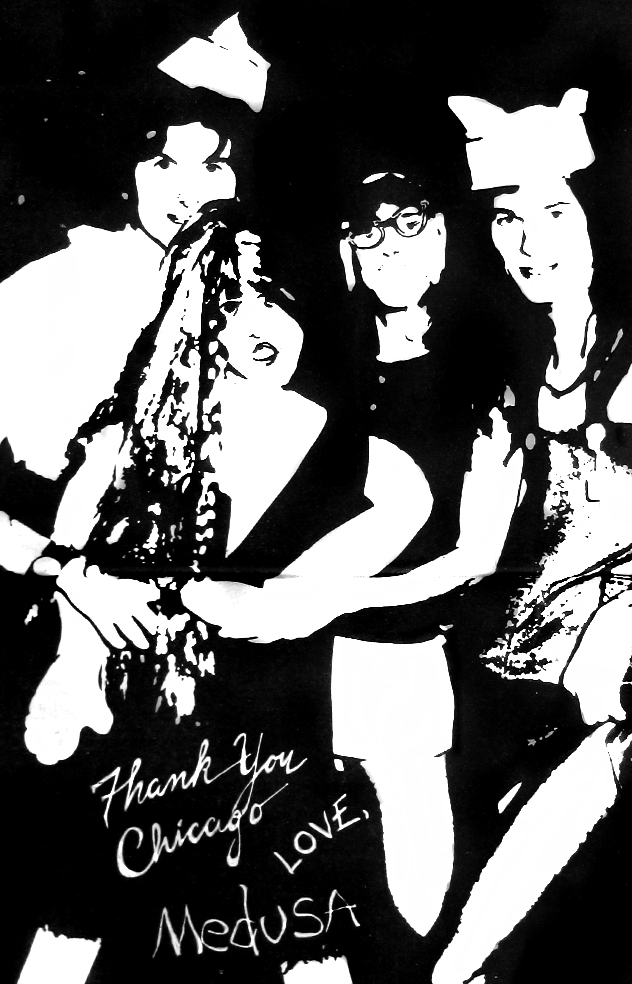 | |
|
|




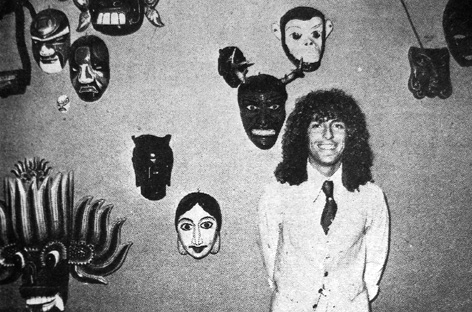
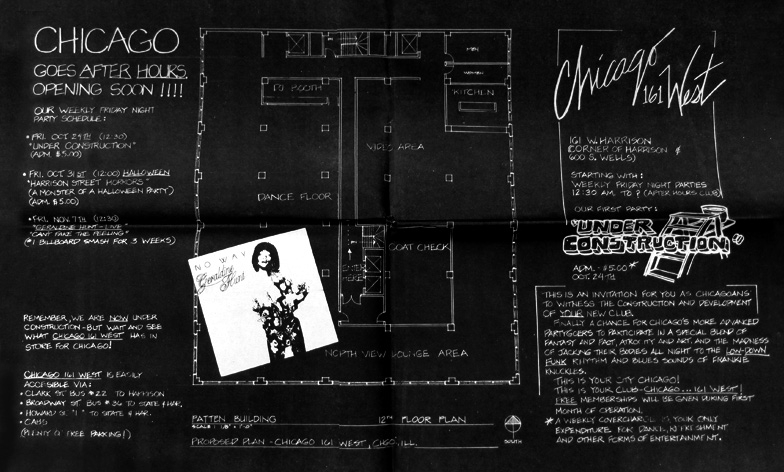
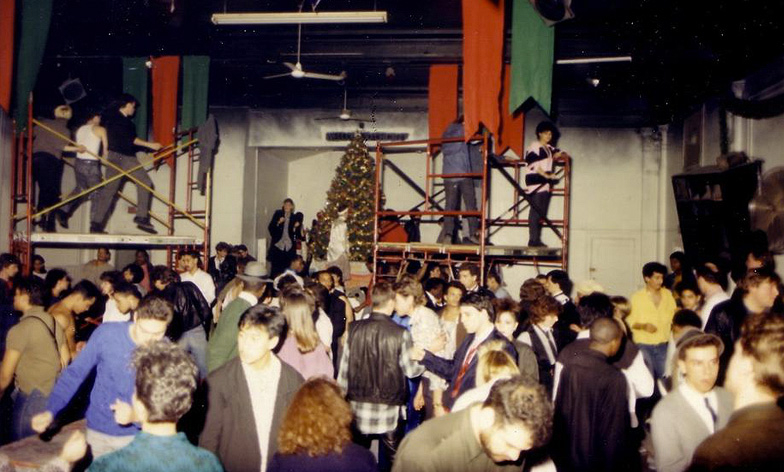
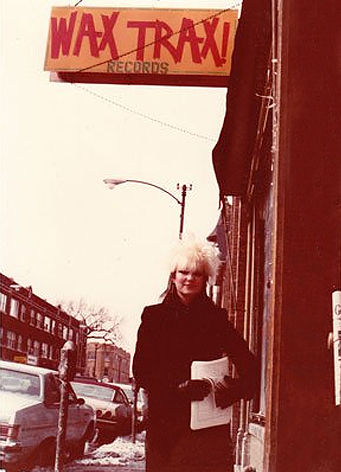
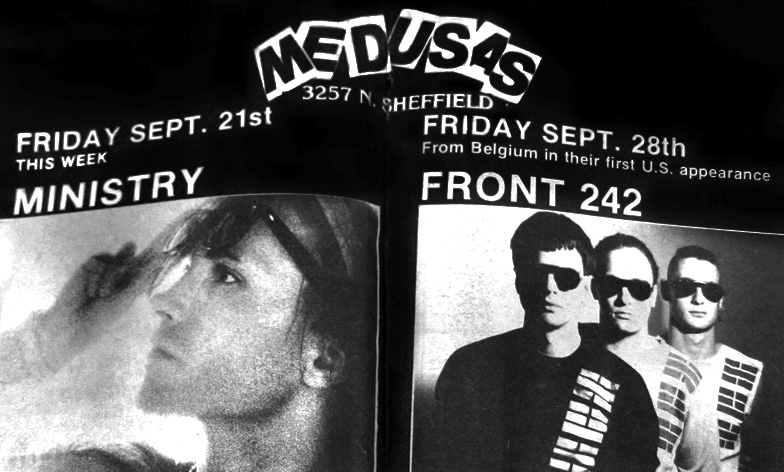
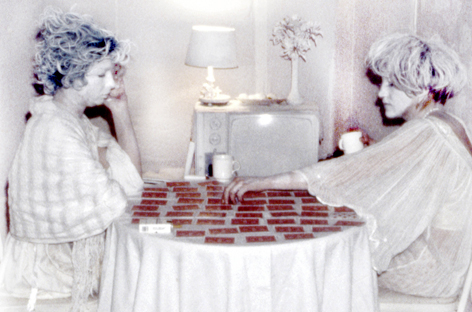
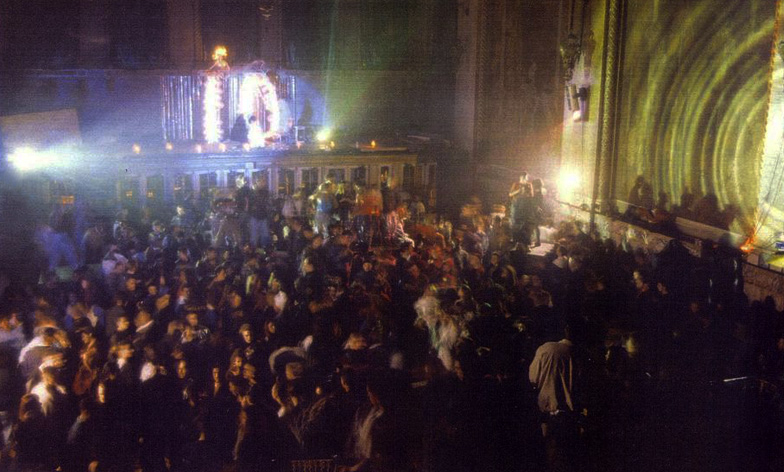
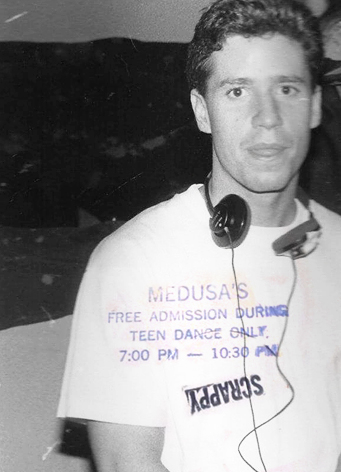

No comments:
Post a Comment